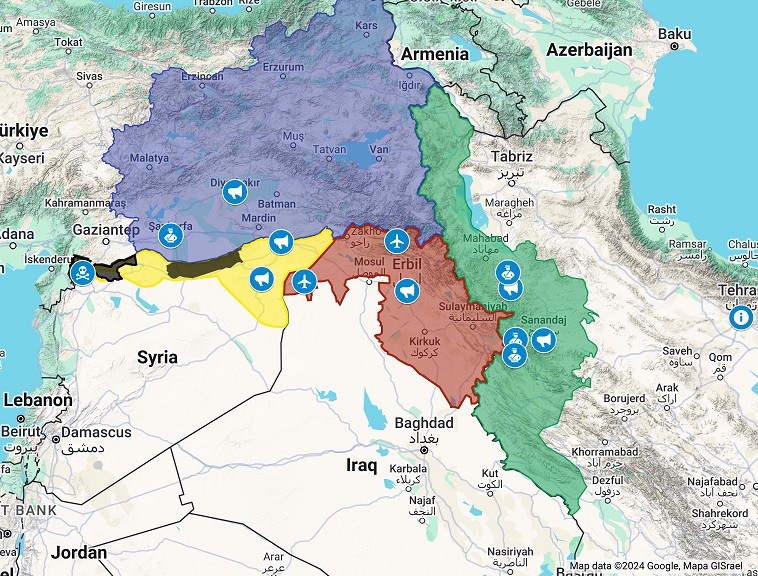1.3K
A weekly brief of events occurred in the Kurdistan regions of Iran, Iraq, Syria, and Turkey.
Iran
- The Iranian regime continued its practice of executing Kurdish prisoners, including four individuals sentenced on non-political charges. Throughout 2024, authorities carried out dozens of executions, many of whom had been sentenced to death but were awaiting implementation for years. Simultaneously, security forces in Pawa detained Awara Haidary, a female Kurdish poet and writer, for her social media activity, though she was later released following extensive investigations. Similarly, in Sawllawa, a Kurdish man was arrested for his alleged affiliation with a Kurdish opposition party. Furthermore, two Kurdish activists, Zaniar Fatahi in Bokan and Sasamn Jamnara in Ilam, received prison sentences of eighteen months and three months, respectively, from the Islamic Revolutionary Courts. On International Women’s Day, the Hengaw Organization for Human Rights reported the execution of twenty-two women in Iran, with 325 women arrested in 2023. Notably, the only woman currently on death row in Iran is Kurdish. Additionally, the United Nations’ Independent International Fact-Finding Mission on the Islamic Republic of Iran (FFMI) documented human rights violations by the regime during the Zhina Amini uprising in 2022. The FFMI highlighted violations against protesters, including the “violations committed against protesters and others, including on the use of force, arrests and detentions, treatment in detention, digital space and legal proceedings related to the protests.” The FFMI, operating under the UN’s Human Rights Council, also noted the “Institutional discrimination against women and girls,” by the regime during the anti-government demonstrations. Lastly, the US Office of the Director of National Intelligence issued a warning that Iran will continue to threaten “US interests, allies, and influence in the Middle East.” The report also acknowledged domestic challenges facing the regime that could impede its further advancement of goals.
Iraq
- Following more than ten rulings against the Kurdistan Region in recent years, Kurdish judge Abdulrahman Sulaiman resigned from the Supreme Court on Tuesday. Sulaiman, one of only two Kurds among the court’s nine members, cited his resignation as a result of his conclusion that there is “a desire” evident in the court’s consecutive rulings “to return to central authority and move away from federal principles.” He expressed frustration at being unable to defend the entity of the Kurdistan Region within the framework of the Iraqi constitution. One recent ruling by the Supreme Court stripped the Kurdistan Region of its authority to distribute salaries to its employees, granting this power instead to the federal government, further undermining the Kurdistan Regional Government (KRG). The legitimacy of the supreme court itself is in question, as it was formed on an unconstitutional basis. The ongoing issues surrounding Kurdistan’s budget and the payment of public employees’ salaries remain unresolved.
- A Turkish airstrike near the Shiladeze subdistrict resulted in the deaths of two civilians on Friday. Turkish attacks on the Kurdistan region have claimed the lives of more than a hundred civilians since their inception in 2015 under the pretext of combatting the Kurdistan Workers’ Party (PKK). On the same day, another Turkish airstrike in the Yazidi town of Shingal (Sinjar) led to the death of a member of the Sinjar Resistance Units (YBS) and injured another.
Syria
- A recently published report by the UN Syria Commission of Inquiry characterized Turkish airstrikes on the infrastructure of the Autonomous Administration of North and East Syria (AANES) as a “violation of international humanitarian law.” The commission highlighted the civilian casualties resulting from Turkey’s attacks and emphasized the urgent need for a ceasefire in Syria. Last week, the Syrian Observatory for Human Rights (SOHR) reported the Turkish intelligence’s arrest of ten Kurds in occupied Afrin on March 6 and 12. Meanwhile, a Syrian regime attack on villages near Afrin resulted in the death of a woman and the injury of four civilians.
- On the anniversary of the Kurdish uprising in Qamishli against the Syrian regime in 2011, the AANES released a statement emphasizing dialogue between opposition powers. “We call on all Syrian national forces to recognize the reality of our pioneering role in Syria and refrain from undermining our people’s resolve. Dialogue is the correct path to resolving all matters,” the statement read.
Turkey
- The pro-Kurdish Peoples’ Equality and Democracy Party (DEM) continues to intensify its local election campaign leading up to March 31. The party released the “Newroz Declaration” in Diyarbakir (Amed), advocating for “peaceful democratic methods” to address the long-standing Kurdish issue across greater Kurdistan. “The Kurdish question is a matter of status, and its resolution is achievable through the status that each part of Kurdistan gains within itself.” Last week, authorities arrested thirty-one Kurds in Urfa and Ankara, primarily members of the DEM party, on charges of “membership in an illegal organization.” In another development, Turkish President Recep Tayyip Erdogan revealed plans to launch a new invasion campaign in Iraq and Syria. Recently, Turkey’s Foreign Minister visited Washington and met with Secretary of State Tony Blinken as part of the “U.S.-Turkey Strategic Mechanism.”

